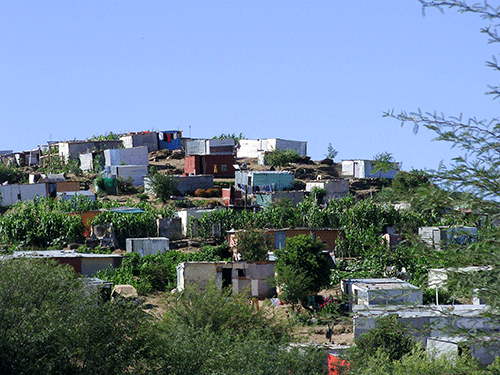Namibia’s housing crisis is slowly being addressed by those who have been priced out of the market by banks, developers and local authorities.
Since Namibia’s independence, the Shack Dwellers Federation of Namibia has built over 7 000 brick houses, each of them with a toilet and water connections.
The SDFN consist of 1 036 saving groups, with a
total number of 32 264 members in 14 regions of Namibia. Members altogether saved over N$34 million by June 2021. The country’s housing backlog is over 300 000. With informal settlements continuously increasing and expanding, it is estimated 40% of Namibia’s 2.5 million population lives in shacks.
According to Hendrina Shuunyuni, the information officer at Namibia Housing Action Group, all those houses acquired through SDFN are occupied by more than four people, which means around 21 000 people have moved into decent shelters.
“The members of the SDFN install affordable basic services (water and sewerage) for less than N$7 000 per household and manage the construction of houses for less than N$40 000 per house, following an incremental/step by step approach, starting with a 34 square metre house. Their active participation in the management and production of the house by the federation members result in lowering the construction costs. A building team is being trained by professionals and this way, they can manage the construction process, appoint the bricklayers, produce their bricks and install sewer and water pipes through training,” she explained.
She added, based on a report to the Land Conference, it was stated that the Shack Dwellers Federation of Namibia built 1 835 houses between 2019 and November 2021.
“This is 49.8% of all the reported houses. But it is most significant that these 1 835 SDFN houses represent 84% of the houses built by low-income people in this period. The federation’s housing construction is supported financially by the urban and rural ministry, Buy a Brick campaign, Pupkewitz Foundation, Ohorongo Cement, MTC, First Rand Foundation/FNB, Office of the First Lady, B2Gold, Osino Minerals and GIZ,” she said. Shuunyuni narrated that apart from building houses, SDFN has gone out of its scope to fight for other groups to succeed in building decent shelters.
Often, excessive red tape obstructs progress.
Ituyeni is one of the savings groups under the SDFN, situated in Havana informal settlement that has had many obstacles that they have overcome over a long period. Shuunyuni narrated that in the year 2000, they got land and signed a contract with the City of Windhoek to pay off the land in five years but they struggled and some members of the group failed to pay off the land and the city decided to take it back because they were late with their payments.
“But the group did not give up and worked hard and got the land back. Agreements were made and in 2014, the group managed to buy the land. The members of Ituyeni were excited. As they were about to start building houses, another challenge occurred. The building plans were not approved as the land needed to be consolidated from a single erven to a block so that, it became affordable to the members. The consolidation of the erven delayed the whole process of acquiring a proper house. House construction only started at the beginning of 2021, 13 houses were constructed, and members are now proud homeowners. The houses were handed over by Erastus Uutoni, Minister of Urban and Rural Development on 21 October 2021,” she said.
Inga Boye from the Ituyeni group reflected on the challenges they have overcome, saying the struggle was real. “There were times when we wanted to give up, because every time we are close to owning a house and hoping for a better home, some new challenges developed. However, we did not give up. All I can say is that for us low-income communities, there is no easy way to get land unless through the SDFN. The federation helped us so much! I’m urging all low-income communities to join the shack dwellers to improve their living standards and acquire affordable housing units,” she said.



